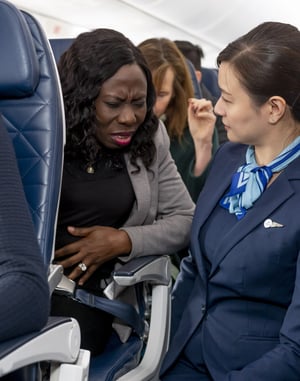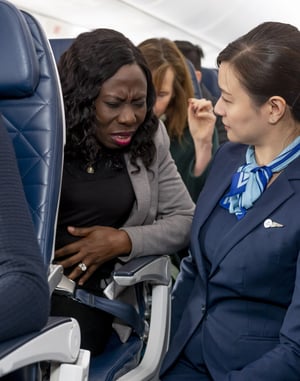
Case Study | Managing a Kidney Stone Crisis In-Flight
An in-flight medical emergency highlights the importance of connectivity and expert support in commercial aviation. Medical incidents during flights are a known operational risk, especially on long-haul routes. While most in-flight events do not result in diversions, the ability to manage medical conditions effectively in real-time is crucial for passenger safety and operational efficiency.
THE CASE
Two hours into a ten-hour flight from London to New Delhi, a passenger reported abdominal pain in the lower left region to the cabin crew. The passenger was in visible discomfort, walked to the lavatory, and vomited.
Following protocol, the crew utilized MedAire's In-Flight App to guide them through a structured assessment, ensuring they asked the right questions and collected comprehensive patient data.

CHALLENGES
- Initial Uncertainty: The passenger's symptoms required careful evaluation to determine the underlying cause and appropriate treatment approach.
- Operational Considerations: The decision to continue the flight or divert required careful evaluation of the passenger's condition, potential risks, and available treatment options.
- Need for Expert Aviation Medical Guidance: While medical volunteers may be available onboard, many are not trained in aviation medicine and may be unfamiliar with the unique challenges of treating patients at altitude. The crew required specialized aviation medical expertise to proceed confidently with treatment recommendations.
MedAire's Support
The crew completed the assessment using the In-Flight App and transmitted the data to MedLink. They then called MedLink, where the physician on duty was able to provide immediate guidance, having already received the comprehensive patient information via the app.
Thanks to the detailed information provided upfront, the MedLink physician immediately made a diagnostic impression of kidney stones based on the location and description of the pain. Given the severity of the discomfort and presence of vomiting, an injectable pain medication would be most appropriate to control the pain, along with another medication to help with the nausea. The MedLink physician verified the presence of adequate medication for this treatment approach.
The crew was instructed to retrieve the Enhanced Emergency Medical Kit (EEMK) and page for a medical volunteer among the passengers. The EEMK, a testament to MedAire's commitment to safety and expertise, is equipped with advanced medications and tools designed to manage severe medical conditions, including cardiac events, allergic reactions, and severe pain.
A nurse responded to the request for a medical volunteer. Following MedLink's instructions, the nurse was able to locate the medications in their respective pouches inside the medical kit and administered the appropriate treatments, confident in the specialized aviation medicine expertise provided. MedLink instructed the flight to call back within 40 minutes to assess the passenger's response to treatment.
At the follow-up call, the passenger showed significant improvement, with reduced pain levels and no further vomiting. With the passenger's condition stabilizing, MedLink advised the crew to continue with the planned route to New Delhi, instructing them not to hesitate in calling back if there was any deterioration in the passenger's condition.
The passenger continued to improve throughout the remainder of the flight, experiencing only minor residual discomfort. MedLink coordinated with ground services to ensure emergency medical assistance would be available upon arrival in New Delhi.
